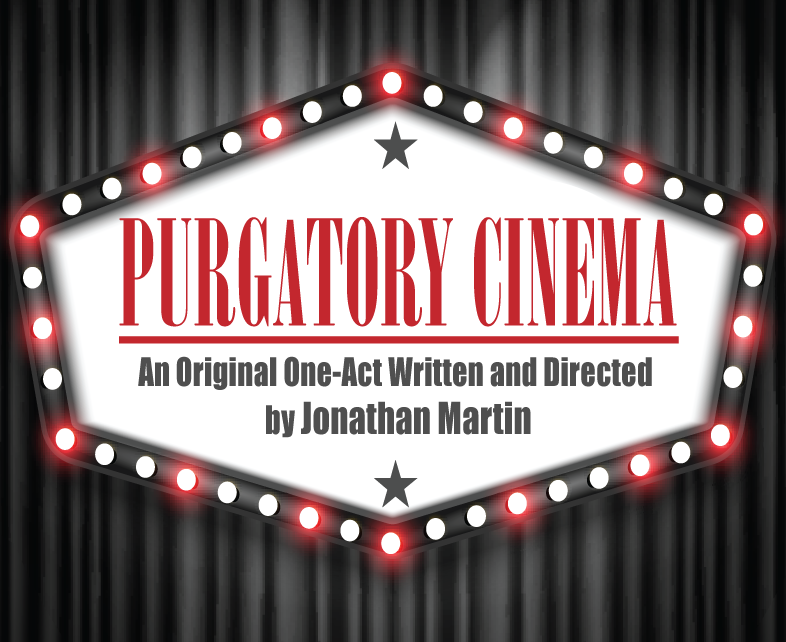By Jonathan Martin
This is my final semester as a writing major here at Oklahoma Christian, and graduation cannot come soon enough. For my final writing project, I decided to write a one-act play and produce it on campus. It’s called Purgatory Cinema. It will be performed in Judd at 8 p.m. on Dec. 2 and 3.
In Purgatory Cinema, the main character, Eric (played by Seth Parker), finds himself stuck in purgatory with a Catholic priest (played by Luke Swanson) and a pessimistic atheist (played by Laura Smethers). While there, he reunites with his estranged daughter (played by Darby Franks) and together, the characters try to figure out a means of escape from purgatory.
While yes, you should come see it, this post isn’t an advertisement. I want to talk about one of the best parts of theater: the collaboration between writer and actor/actress to create art on stage.
By collaboration, I mean how actors choose to embody characters already created by an author. Usually, this process involves transformation of both actress and script. The director, though a helpful guide, usually does not dictate how an actor or actress must play their role; the responsibility is theirs.
I conducted a few brief interviews with my actors to get their thoughts on how this collaboration plays out. Smethers talked about how the actress and script must both change to fit the other.
The dynamic of the character on stage radically differs from what I first envisioned. Her character was originally a man named Jim. But since I casted Smethers, we changed the character’s name to Jamie. Her verbal sparring with the other characters on stage takes a completely different tone because of the gender change and because of how Smethers plays the character. Rather than a salty, arrogant, know-it-all businessman, Jamie is a sassy, pessimistic woman who can’t be silenced.
If we’d wanted to, the personality of the character could have stayed the same even with a performer of the opposite gender. But to best represent Smethers’s vision for Jamie, the script had to conform to my casting choice.
Swanson told me about how an author loses ownership of his or her work once the script is in the hands of the actors. At that point, it is up to the director to take their own interpretation and work with the cast to produce a version of that interpretation while allowing the actors and actresses to fully realize their characters.
In my case, the writer happens to be the director, so I have more knowledge about the original vision, but in our rehearsals and preparation, I’ve been careful not to let my initial intent interfere with how my cast wants to portray their characters. The script doesn’t belong to me anymore. It belongs to them. I have had to set aside the “writer” part of me — the person who spent most of his summer toiling over the most rudimentary versions of these characters — and assist my cast in producing the best version of our production, not the best version of my script. And when we finally bring in an audience and perform it, the script won’t belong to the cast. It will belong to the audience in the form of their response and interpretation.
I lost control of how people interpret my play a long time ago when I started letting other people read it. Now that responsibility lies in the hands of my incredibly talented cast. Purgatory Cinema belongs to Parker, Franks, Smethers and Swanson. As the writer, I can only hope they will take care to accurately present the best version of the characters I created.
The last few weeks have been a blur. My cast is tired and busy. Putting on a show so close to finals has not been easy, and in the coming days we will only get busier. But we have made something together: the first-ever production of this original piece. I speak for the rest of the cast when I say we cannot wait to share our hard work with the rest of the campus.
Jonathan Martin is a senior at Oklahoma Christian University.
The opinions of guest columnists are their own and do not necessarily reflect the opinions of the Talon or Oklahoma Christian University. Guest opinions are presented to foster public debate on important topics and comments should be respectful and signed.














Be First to Comment